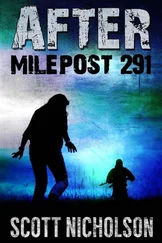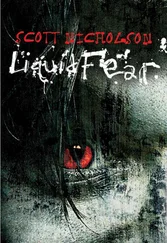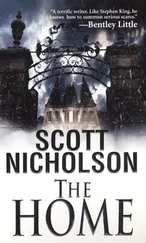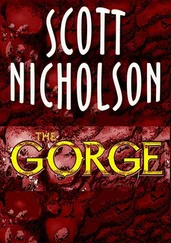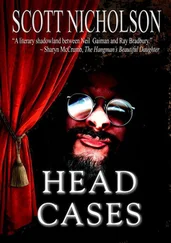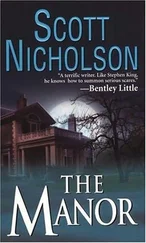Scott Nicholson - Chronic fear
Здесь есть возможность читать онлайн «Scott Nicholson - Chronic fear» весь текст электронной книги совершенно бесплатно (целиком полную версию без сокращений). В некоторых случаях можно слушать аудио, скачать через торрент в формате fb2 и присутствует краткое содержание. Жанр: Триллер, на английском языке. Описание произведения, (предисловие) а так же отзывы посетителей доступны на портале библиотеки ЛибКат.
- Название:Chronic fear
- Автор:
- Жанр:
- Год:неизвестен
- ISBN:нет данных
- Рейтинг книги:3 / 5. Голосов: 1
-
Избранное:Добавить в избранное
- Отзывы:
-
Ваша оценка:
- 60
- 1
- 2
- 3
- 4
- 5
Chronic fear: краткое содержание, описание и аннотация
Предлагаем к чтению аннотацию, описание, краткое содержание или предисловие (зависит от того, что написал сам автор книги «Chronic fear»). Если вы не нашли необходимую информацию о книге — напишите в комментариях, мы постараемся отыскать её.
Chronic fear — читать онлайн бесплатно полную книгу (весь текст) целиком
Ниже представлен текст книги, разбитый по страницам. Система сохранения места последней прочитанной страницы, позволяет с удобством читать онлайн бесплатно книгу «Chronic fear», без необходимости каждый раз заново искать на чём Вы остановились. Поставьте закладку, и сможете в любой момент перейти на страницу, на которой закончили чтение.
Интервал:
Закладка:
She reached for the backpack, but he snatched it away from her and slung it over his shoulder with the assault rifle. He looked through her purse, evidently finding nothing suspicious.
He gave her the car keys and then the purse. “I’m in no condition to drive.”
She didn’t argue.
CHAPTER TWENTY-SIX
Scagnelli loved this kind of job, even if he’d rather be taking out the Cheese Guy.
The two CIA agents who had raided Dr. Morgan’s lab were relatively fresh-faced. Or, at least, clean-shaven. They’d finished off their food at Bella Bistro on Franklin Street, each with pasta dishes, a plate of sloppy bruschetta between them. They were drinking a deep burgundy wine that probably cost ten bucks a glass.
They were dark-skinned, and besides the alcohol consumption, they could easily be taken for Middle Easterners. Azim, the one on the left, had been an overseas operative until he’d been made, at which point he’d been reassigned to the States. Of course, his stereotypical appearance aroused suspicion and thus he could only work in major metropolitan areas where his ethnicity wouldn’t raise red flags.
Fortunately for him-at least up until tonight, when his fortune would go bad-Chapel Hill was one of the most international communities in the world.
Adrianus, the Greek sitting opposite, was also dark-skinned, and his radiant black hair and eyes also marked him as a foreigner. Scagnelli had actually met Adrianus once and had taken an instant dislike. Maybe it was genetic memory, dating all the way back to the Roman Empire, but Scagnelli had privately hung the nickname “Goatbreeder” on him.
Goatbreeder and Baby bin Laden symbolized all that was wrong with the nation’s security forces. It was part of the reason Scagnelli had abandoned agency work. He wasn’t a racist, naturally, but he saw the inherent flaw in using foreigners to preserve domestic policy.
“More water, sir,” the waiter said. He was a college kid with sleepy eyes who carried himself with a sense of insouciant entitlement.
Scagnelli felt like dashing the remaining half of his water in the kid’s face, but that most definitely would draw attention. Instead, he said, “What sort of wines are you serving tonight?”
The kid grinned, sensing a bigger tip, and hustled off to get a drink menu. Scagnelli, sitting outside on the patio at a small wrought-iron table, chanced another peek through the window to the restaurant’s interior. Goatbreeder was laughing, swirling his wine around and taking a sniff of it before sipping.
Scagnelli wanted to kill him just for that irritating, pompous gesture if nothing else.
But he realized he was getting too emotional. This was just a job.
When the waiter brought his wine, he imitated Goatbreeder’s gesture, trying to blend in with the well-to-do intellectual class that was sucking on the university tit and drawing taxpayer milk. He’d taken a second dose of amphetamines, and the speed was making his skin itch. He couldn’t afford to get wired just before the job, so he gulped the wine instead of sipped, intending to mellow out the speed buzz.
A woman at the next table curled her lip at his performance as though he’d farted. Scagnelli toasted her and took another gulp. Her husband, a miserable-looking man who probably faced a dozen more years of ball-busting before mustering up the nerve to get divorced, caught her gaze, glanced over, and turned his attention back to his salad.
Inside, Baby bin Laden waved for the check, the agents apparently deciding to skip dessert. Goatbreeder took a last messy bite of the bruschetta, causing them both to laugh when a chunk of tomato tumbled free and plopped into his wine glass. Baby bin Laden paid with his credit card, scrawling his tip with a flourish when the water brought the receipt.
Goatbreeder fished the tomato chunk out of his wine with his finger. Scagnelli looked over at the scowling woman, hoping she would notice and launch into a fit of apoplexy. But she was griping at her husband, who gave his bobblehead “Yes, dear” nod, a motion so rehearsed it had created wrinkles in his neck.
At last, the CIA duo stood, and Scagnelli hurriedly downed the dregs of his wine. He stood, dug into his wallet, and slipped a ten on the table. He was hurrying around to the front, where the two agents would emerge, when the waiter called to him.
“Sir? Sir?”
Scagnelli frowned, with several diners now watching him. “I left my tab on the table.”
“You left a ten, sir. Our Pinot Grigio is twelve dollars per glass.”
Scagnelli dug into his wallet again. He wanted to shove the five in the kid’s mouth, but instead made a small flourish of sticking the five in his vest pocket. He gave the kid’s red bow tie a tug and said, “Keep the change.”
By the time he got to the entrance, the two agents were gone. Scagnelli didn’t want them to separate. Under ordinary circumstances, he would have preferred to divide and conquer, but the job had to be finished tonight.
He hurried to the parking lot, a dimly lit patch of cracked asphalt that was hidden from the restaurant by high tangled shrubs and a Dumpster enclosure that didn’t smell any fancier than the garbage from a fast-food joint, Pinot Grigio or not. One of the agents was laughing, obviously in a good mood and secure in the belief that here in Chapel Hill, North Carolina, danger didn’t dwell in every shadow and gutter.
Scagnelli kept his head down and marched purposefully in their general direction, but not straight toward them. Goatbreeder was talking about the Tar Heels, the university’s basketball team that had apparently lost in something called “The Sweet Sixteen.”
As Baby bin Laden mimed taking a hook shot, Scagnelli veered toward them and extended a friendly hand in a wave. “Adrianus? Is that you?”
Baby bin Laden froze in mid-motion, awkwardly standing with his arm curved in the air. The Greek turned with narrowed eyes. “Excuse me?”
“It’s me. Dominic Scagnelli. We had that seminar together in the Pentagon.”
“Scagnelli.” Goatbreeder puckered his olive lips, his accent blowing any cover he might have used. “Maybe.”
“Called ‘Decoding the Obvious.’ Remember that fat bastard telling us that if it walks like a duck and quacks like a duck, it’s probably a pigeon?”
Goatbreeder gave an uneasy laugh. “Yes, yes. Now I do. Are you still with the Bureau?”
“Yeah, you know how it is. This gig, we’re like monks, we’re in for life.” Scagnelli smiled to include Baby bin Laden in their brotherhood of government ineptitude, good guys trying to get through the day in a system that made no sense.
“Who’s your partner?” Scagnelli said.
“Azim.”
They shook hands. Baby bin Laden’s was greasy, probably from the butter rolls. “So, what brings you to Chapel Hill?” Goatbreeder asked, clearly expecting Scagnelli to deliver the kind of lie typical for the profession-visiting an aunt, business conference, medical tests.
“I could tell you, but then I’d have to kill you.”
Neither of them laughed. The joke was too old. Scagnelli continued. “I’m on this thing, some crazy shit. A researcher here is playing with a drug that opens people’s brains like stripping away the layers of an onion, getting down there to the primitive impulses. Sounds like horseshit to me, but you know how the Puzzle Palace gets when they smell a chance at mind control.”
Scagnelli knew he’d breached protocol. Even if they were all on the same case, a good agent never acknowledged that fact. The culture of subterfuge meant they all had to overlook the obvious.
“We’re actually on vacation,” Goatbreeder said.
“Golfing.” Baby bin Laden gave an awkward swing, clearly revealing he’d never held a nine-iron in his life.
Читать дальшеИнтервал:
Закладка:
Похожие книги на «Chronic fear»
Представляем Вашему вниманию похожие книги на «Chronic fear» списком для выбора. Мы отобрали схожую по названию и смыслу литературу в надежде предоставить читателям больше вариантов отыскать новые, интересные, ещё непрочитанные произведения.
Обсуждение, отзывы о книге «Chronic fear» и просто собственные мнения читателей. Оставьте ваши комментарии, напишите, что Вы думаете о произведении, его смысле или главных героях. Укажите что конкретно понравилось, а что нет, и почему Вы так считаете.

